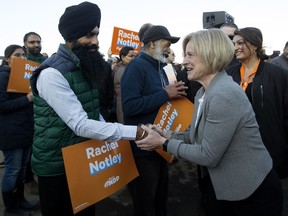Keith Gerein: Early election projections not adding up well for NDP

Article content
Math is difficult.
You may remember that ill-advised nugget of condescension then-Progressive Conservative leader Jim Prentice threw at the NDP’s Rachel Notley during the 2015 election debate.
It was a turning point in the campaign, cementing the transformation of Notley’s crew from upstart underdogs to legitimate election force.
Prentice never recovered from his gaffe. Math is difficult became a rallying point for the NDP, which went on to win its first majority government in Alberta.
Fast forward four years, and the phrase has taken on a different meaning.
In 2019, it turns out math really is difficult for the NDP.
Election math. As in, it’s difficult to calculate many realistic scenarios that add up to Notley winning a second term.
The race has barely begun and there’s a good chance it’s already over.
I don’t say this lightly or with any kind of merriment. No matter what party you might support, I believe it’s in Alberta’s best interests to have a real contest rather than a cakewalk.
But poll numbers released at the start of the campaign suggest the province is marching toward exactly that type of UCP coronation, and the only question left is how many jewels will be encrusted in Jason Kenney’s crown.
With some variance, the poll results essentially say the same thing. The NDP and UCP are waging a competitive battle in Edmonton, and almost nowhere else.
Battleground Calgary is more like Bloodbath Calgary at this point, where polls indicate the UCP has an edge of well over 20 points among decided and leaning voters.
(An Angus Reid Institute poll released Thursday showed a UCP lead of about half that size in the Calgary region.)
In the rest of Alberta, which includes rural areas and mid-size communities, the projected gaps are even more enormous. Other than Lethbridge, Red Deer and a couple of other areas that may still be in play, the UCP has this part of the province sewn up.
That gives Kenney a huge advantage to start the election.
Think of it this way.
Alberta has 87 ridings, about 35 of which can be characterized as distinctly rural. A total of 44 seats are needed to form a majority government.
In that sense, the election can be thought of like a hockey playoff series — a really long playoff series — in which the first team to secure 44 wins gets the trophy.
Because of their dominance in the rural ridings, the UCP is essentially starting off the series with something like a 35-0 lead. They need only nine more wins in the rest of the province to capture a majority.
This is why the math currently doesn’t work for the NDP.
All that said, its important to remember polls are snapshots of a particular moment in time, and have far from a perfect track record in predicting outcomes. Some methodologies are better than others, and it isn’t always easy to tell the difference.
As well, Notley suggested her party’s internal polling shows much more favorable movement toward the NDP, which is partly why she felt good about calling the election on Tuesday. (Trailing parties often say this, mind you.)
There’s also more than three weeks left in the race for stuff to happen, and the NDP leader has often been heard to say that campaigns matter.
The campaign in 2012 certainly did, when blunders by the Wildrose party allowed the PCs to stage a late comeback.
And so did the one in 2015, when Albertans finally realized they were sick of the PCs and saw a credible alternative in the NDP.
But Mount Royal University political scientist Duane Bratt suggests those two cases may have been exceptions in Alberta. Voters tend to forget the preceding decades, in which the province ploughed through a series of dull, conservative-dominated elections that were mere formalities, he said.
Of the current race, Bratt said the NDP may now have a sliver of hope from the “kamikaze” controversy that has put Kenney’s character and credibility under a cloud.
The polling published this week was largely conducted before emails surfaced Sunday indicating Kenney’s UCP leadership campaign in 2017 did — despite his repeated denials — collaborate with fellow candidate Jeff Callaway’s efforts to smear rival Brian Jean.
The polling was also conducted before Kenney’s cringe-worthy suggestion on Monday that such collaboration was “normal” campaign business.
Based on those developments, voting intentions may have already shifted, while further revelations about the scandal could come out.
Still, while the controversy is significant enough to put momentum on the NDP’s side, the hill Notley has to climb is likely too steep, Bratt said.
Trying to make up that ground with a campaign focused on Kenney’s credibility and anti-LGBTQ history is risky, since it can turn off as many voters as it attracts.
Negative campaigning has been shown to work if it contains a grain of truth, Bratt said, but is a tough sell right now for a province that has endured such long-term economic distress.
The election math is not yet impossible for the NDP.
But the equation that leads to an orange victory party on April 16 is becoming increasingly difficult to solve.






Postmedia is committed to maintaining a lively but civil forum for discussion. Please keep comments relevant and respectful. Comments may take up to an hour to appear on the site. You will receive an email if there is a reply to your comment, an update to a thread you follow or if a user you follow comments. Visit our Community Guidelines for more information.